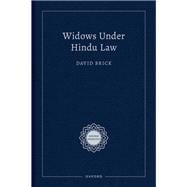During British colonial rule in India, the treatment of high-caste Hindu widows became the subject of great controversy. Such women were not permitted to remarry and were offered two options: a life of seclusion and rigorous asceticism or death on the funeral pyre of a deceased husband. Was this a modern development, or did it date from the classical period? In this book, David Brick offers an exhaustive history of the treatment and status of widows under classical Hindu law, or Dharmasastra as it is called in Sanskrit, which spanned approximately the third century BCE to the eighteenth-century CE.
Under Dharmasastra, Hindu jurists treated at length and at times hotly debated four widow-related issues: widow remarriage and levirate, a widow's right to inherit her husband's estate, widow-asceticism, and sati. Each of the book's chapters examine these issues in depth, concluding with an appendix that addresses a widow's right to adopt a son-a fifth widow-related issue that became the topic of discussion in late Dharmasastra works and was a significant point of legal contentions during the colonial period. When read critically and historically, works of Dharmasastra provide a long and detailed record of the prevailing legal and social norms of high-caste Hindu society. Widows Under Hindu Law uses lengthy English translations of important passages from Hindu legal texts to present a largescale narrative of the treatment of widows under the Hindu legal tradition.
This is an open access title. It is available to read and download as a free PDF version on the Oxford Academic platform. It has been made available under a Creative Commons Attribution-Non Commercial-No Derivatives 4.0 International licence.








